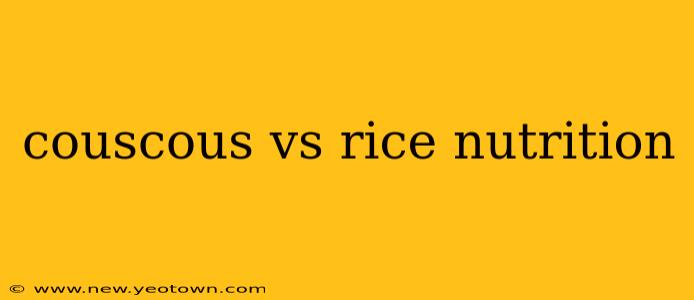The dinner table dilemma: couscous or rice? Both are staples in countless cuisines, offering versatility and a comforting familiarity. But when it comes to nutrition, which grain reigns supreme? Let's delve into a delicious comparison, exploring the nutritional differences and helping you make an informed choice for your next meal.
Our story begins in the bustling marketplace, where fragrant baskets overflow with pearly grains of rice and delicate, fluffy couscous. Each holds a unique place in culinary traditions worldwide, but their nutritional profiles tell a fascinating tale.
Couscous: The Tiny Grain with Big Benefits
Couscous, a staple in North African and Middle Eastern cuisine, isn't technically a grain but a pasta made from semolina, a coarse flour derived from durum wheat. This seemingly small detail significantly impacts its nutritional makeup.
While often perceived as a simple side dish, couscous offers a surprisingly robust nutritional profile. It's a good source of carbohydrates, providing energy for your daily activities. But it's not just empty carbs; couscous also contributes fiber, essential for digestive health and keeping you feeling full and satisfied. This fiber content helps regulate blood sugar levels, making it a more suitable option for those managing diabetes than some refined rice varieties.
Is Couscous Gluten-Free?
This is a frequently asked question, and the answer is nuanced. Standard couscous is made from durum wheat semolina, thus containing gluten. However, you can find gluten-free couscous made from other grains like rice or corn. Always check the label to be sure.
Rice: A Global Culinary Champion
Rice, on the other hand, boasts an unparalleled global presence, with thousands of varieties cultivated across continents. This diversity translates into a wide range of nutritional profiles. Brown rice, for instance, reigns supreme in terms of nutritional density, while white rice, having undergone more processing, offers fewer nutrients.
Brown rice, with its bran and germ intact, is a powerhouse of fiber, vitamins, and minerals. It's an excellent source of magnesium, manganese, and selenium, all vital for various bodily functions. White rice, while convenient and readily available, is mostly carbohydrates and lacks the nutritional richness of its brown counterpart.
What are the Different Types of Rice?
From long-grain to short-grain, basmati to jasmine, the world of rice is vast. Each variety offers subtle differences in texture, flavor, and nutritional composition. Long-grain rice tends to be fluffier, while short-grain rice becomes stickier when cooked. Different varieties also contain varying amounts of nutrients and fiber.
The Nutritional Face-Off: Couscous vs. Rice
Let's break down a direct comparison using 100g cooked servings:
| Nutrient | Couscous (Durum Wheat) | Brown Rice | White Rice |
|---|---|---|---|
| Calories | ~112 | ~111 | ~130 |
| Carbohydrates | ~22g | ~22g | ~28g |
| Fiber | ~2g | ~2g | ~1g |
| Protein | ~5g | ~2g | ~3g |
| Iron | ~1mg | ~0.8mg | ~0.4mg |
| Magnesium | ~30mg | ~70mg | ~13mg |
Note: These are approximate values and can vary based on the specific type of couscous and rice.
Which Grain is Healthier?
The "healthier" option depends largely on your individual needs and dietary preferences. Brown rice generally boasts a higher concentration of vitamins, minerals, and fiber, making it a more nutritionally complete choice. However, couscous offers a decent amount of protein and fiber, particularly compared to white rice.
Choosing the Best Grain for Your Needs
Ultimately, both couscous and rice can be part of a healthy diet. Consider these factors when making your decision:
- Fiber needs: If you need a fiber boost, choose brown rice or consider whole wheat couscous.
- Gluten sensitivity: Opt for gluten-free couscous if needed.
- Nutrient density: Brown rice generally wins in this category.
- Personal preference: Ultimately, the best choice is one that you enjoy and will eat regularly.
So, the next time you're faced with the couscous vs. rice dilemma, remember this detailed comparison. The winner isn't a single grain but the one that best fits your dietary goals and tastes. Enjoy!

